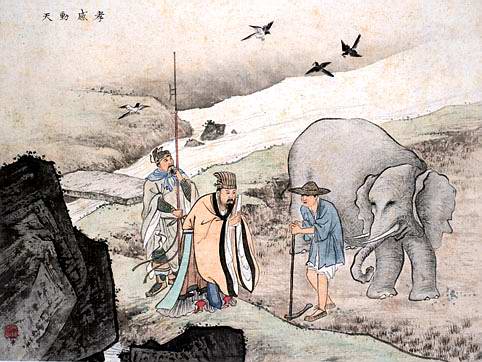As one of the cores of Chinese culture, "filiality" is not only the moral code for maintaining family relationships in Chinese society for thousands of years, but also the traditional virtue of Chinese Nation. A Yuan-dynasty writer Guo Jujing compiled the stories of 24 filial exemplars in ancient times and finished the Stories of Filiality. Reviewing these stories will help us better show filial respect for the elderly.
Filial Conduct That Moved the Heart/Mind of Heaven: Shun The Great
 |
|
Great Yao was an Emperor both humane and virtuous. Under his rule, the citizens of China were both obedient and harmonious. They looked up to their Emperor and treated him as respectfully as they did their own parents. Yao, however, had grown old, and decided to request his military and civilian cabinet ministers to select a wise and worthy successor, so that he could hand down the duty of ruling all of China to him. The Emperor's advisors told him, "There is a devoted filial son at Li Mountain named Shun. Although his family does not get along, he still treats them with a proper attitude of respect and affection. His father, Gu Sou, is unreasonable, and harsh. His step-mother is petty by nature, and constantly abuses and scolds her son. Shun's step-brother, Xiang, is arrogant and lazy. He is jealous of his older brother and wants to do him in. Living in such a family, Shun manages to not resent them; he behaves as a devoted son and brother should."
The ministers told the Emperor, "When his family scolds or beats him, he doesn't bear a grudge or strike back. He simply runs out into the fields where no one can see him and cries to himself. You can find this boy plowing the fields every day, and doing the planting and weeding. His father and brother never lend a hand. Shun's devotion to filial respect does, however, inspire the heavens and the earth to respond. How do we know this is true? The elephants come down from the mountains to plow the furrows for this young man; in the Spring you can see them line up and use their tusks to dig the earth. In the Summer the crows and magpies flock down to pull up the weeds with their beaks. Nature itself approves of his righteous attitude, especially in the face of hardship, as in the case of his impossible family situation."
Hearing about Shun's filial conduct inspired Emperor Yao to dispatch nine of his sons to assist Shun with the farming work. He instructed his daughters, named E Huang and Nü Ying to serve Shun as his wives. The Emperor put the young man through years of training and testing, and when he felt satisfied with his capabilities, he bestowed the throne of Emperor on him, and retired from the duties of ruling China. Under Shun's guidance, the people of China prospered. Following his virtuous influence, all creatures enjoyed peace and happiness. Such were the manifold benefits of a proper attitude of filial respect.
A verse in his honor says,
Elephants in file plow the fields in spring.
Little birds in flocks come weed the summer grass.
Following Emperor Yau, he took the Dragon Throne.
His filial conduct touched the hearts of creatures under heaven.
We recommend:
